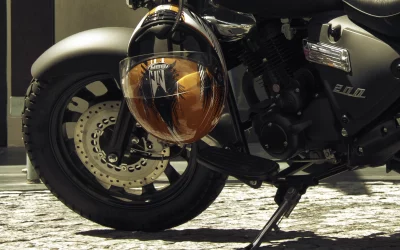I was in a Motorcycle Accident in Colorado Springs
Motorcycle accidents occur regularly, particularly in Colorado, where the warm weather beckons motorcycle enthusiasts to take a pleasure ride. However, joyriding may be a risky activity.
According to the Colorado Department of Highway Safety and Motor Cars, more than 8,700 motorcycle collisions occurred on Colorado’s roads and highways in 2018, resulting in over 500 deaths. When bicyclists are engaged in an accident, they run a significant risk of severe injury or death due to their lack of protection when another car collides with them.
You may feel overwhelmed if you are involved in a motorcycle accident. Along with the physical agony associated with your injuries, you may be angry, disturbed, and have difficulty thinking clearly about the measures you need to take after the accident.
If you are lucky enough to survive a bike accident, you must do as many of the following duties as possible in the minutes, days, and weeks after your accident. If you cannot move or do some of these tasks due to serious injury, a loved one may act on your behalf.
Free Consultation
In Person | Phone | Zoom
Allow a Physician to Examine You for Injuries
If you are involved in a motorcycle accident, it is quite probable that emergency responders will arrive on the spot and transfer you to the closest emergency facility for treatment.
If you are lucky enough to walk away from the accident, you must put your health first and seek medical attention immediately. To begin, the adrenaline surge that occurs during and after an accident may keep you from experiencing pain soon after the injury.
Second, not all injuries manifest symptoms immediately. TBIs are prevalent in motorcycle accidents, even when the rider is wearing a helmet. While the helmet may absorb some of the energy of the impact, colliding with the pavement may still inflict damage, and you may not notice the injury for hours or days after the accident.
Other less obvious injuries include shattered ribs and internal bleeding. Choosing to see a doctor immediately may save your life.
Additionally, your medical records serve as proof of the accident and your injuries if you seek compensation later. Insurance companies and legal defense attorneys will have a tough, if not impossible, time arguing that your injuries were caused by another accident or accident if you record them immediately. Medical paperwork may also be used to negotiate a settlement with the insurance company of the at-fault motorist.
Collect Contact Details
When law enforcement officers arrive at the site of a motorcycle collision, they will collect information from drivers and witnesses, but they may make mistakes or omissions.
While you wait for them to get on the scene, gather as much information as possible from everyone involved in the accident. Inquire of drivers, passengers, and any witnesses who have stopped at the site for their names, addresses, email addresses, and phone numbers.
Additionally, you should get drivers’ insurance information and keep track of the license plate numbers of any cars involved. In certain situations, motorists get agitated and attempt to flee the scene of an accident, particularly if they know they caused the accident or have a lengthy record of traffic offenses.
Collecting information as soon as possible protects you against careless drivers who flee the scene of the collision. However, avoid disclosing the specifics of the accident. Avoid admitting responsibility or making statements that might be used against you later to diminish the value of your injury claim.
Collect Photographic Proof
Photographic evidence, if obtainable, is more trustworthy than a handwritten account of an accident scene. The accident scene contains vital evidence and information that may assist investigators and insurance companies determine who is at fault in an accident.
While law enforcement officers will almost certainly take photographs upon their arrival, you may defend yourself by taking further photographs before the evidence is removed. Police officers make errors, and although having more photographs may not assist you, having further information never hurts.
Begin by recording or photographing the damage to your motorcycle and the car(s) involved in the collision using your smartphone. Each accident is unique, but you should concentrate on photographing anything that may be used to support an insurance claim or litigation.
This includes photographing any dangers that may have contributed to the collision, any other road conditions, and the license plates of the cars involved. Additionally, you should photograph any obvious injuries.
Obtain a copy of the police report
You will want to get a copy of the final traffic collision report shortly after your motorcycle accident. It may take up to ten days for law enforcement to finish the report. You may obtain the report online for $10 plus a $2.00 convenience charge from Colorado’s Department of Highway Safety and Motor Cars.
Once your transaction is complete, you immediately have access to the crash report and are required to download it within 48 hours. If you want to get a copy of your collision report in person, you may do so at any Colorado Highway Patrol Troop Station; however, you must complete and submit a Sworn Statement to Obtain Crash Report along with your fee.
Submitting an Insurance Claim
Colorado is a no-fault insurance state, which means that anybody who registers a motor car is required to carry minimum levels of property damage liability and personal injury protection (PIP); however, motorcycle riders are exempt from these requirements.
This implies that if you were involved in a motorcycle accident caused by another party, you could not seek damages under your injury protection coverage. If you have PIP coverage for a motor car, it will not cover your motorcycle in the same way as it would a bicycle.
To begin recovering losses, you first submit a claim with your motorcycle insurance company if you have one. The majority of insurance companies require you to report every collision, regardless of guilt. Your policy will have precise criteria, but if you fail to report the accident, your insurance provider may cancel or refuse to renew your coverage.
When you contact your insurance provider, they will initiate contact with the at-fault driver’s insurer. If you do not have motorcycle insurance, you should first contact the at-fault driver’s insurance company to report the collision.
Remember that an insurance company is not your friend, much more so if you are not the insured. Notify the authorities of the collision but provide no other information. The carrier will dispatch an adjuster and/or investigator to gather the data necessary to establish guilt. Excessive communication may provide the business with the information they might use to reject or lower the value of your claim.
Maintain a file of bills, receipts, and pay stubs.
Due to the serious injuries that often result, motorcycle accidents are among the most costly types of traffic accidents in terms of physical harm, medical care, and lost income. To win a personal injury case or get complete and fair compensation from an insurance carrier, you must establish all economic losses incurred due to the accident and your injuries.
This includes not just physical damage to your motorcycle but also medical expenses, transport to and from the doctor for treatment and follow-up, prescriptions, and over-the-counter pain medicine. Visits to specialists such as physical or occupational therapists may also be included in medical expenses.
If you get serious injuries in a motorcycle accident, you will almost certainly lose many weeks, if not months, of work. You must give documentation of your pay before the accident and lost earnings due to hospitalization and any paid time off you were required to take as a consequence of the injury. Additionally, you should keep track of domestic substitute services to assist you with tasks you performed before your injury.
Examples include lawn care, cleaning, and babysitting. If you need to modify your house after an accident, you should save those receipts from discussing them with your attorney. Examples include the installation of handrails, the addition of a wheelchair ramp, or the construction of the main floor expansion if you cannot ascend or descend the stairs.
Maintain a Daily Journal
When you sue an at-fault motorist, a portion of the suit’s worth is determined by your non-economic damages, which are sometimes difficult to measure. As soon as you are physically capable, you should begin keeping a daily notebook in which you describe your feelings. This is particularly critical if you’ve had a catastrophic brain injury. Not only can the journal give proof for your claim, but it may also provide information to your doctor about the symptoms you are having, allowing them to treat your disease more effectively. If you have significant visible injuries, you should also photograph your healing progress every week.
Never Discuss Your Claim with Anyone
The insurance company for the at-fault driver will examine the motorcycle collision and will question you about it. Insurance adjusters get significant training and experience convincing accident victims to say things that devalue their claim, allowing the corporation to escape part or all financial liability for an accident.
Typically, adjusters will also interview the victim’s friends and relatives. While your family and friends are worried about you and want to hear about your injury, it is advisable to withhold
information until your claim has been resolved or contested. As a result, it is recommended to delegate all discussions with insurance providers to an attorney.
Insurance adjusters will hunt for any reason to reduce the value of your claim. Social media contacts might go against you if investigators misinterpret postings or photographs. They may discover images that may be used to minimize your injuries or to claim you are recovering more quickly than you reported.
They may also search your social media history for proof that you were involved in another accident. You are not required to remove your Facebook, Twitter, or Instagram accounts, but you should refrain from posting anything until your motorcycle accident claim is resolved or litigated.
Refuse to Accept an Offer of Early Settlement
After an insurance company investigates an accident, they will probably determine if their insured was to blame. However, insurance firms do not survive on paying every claim that comes their way. Even if they cannot reject a claim, they will take steps to pay as little as possible. Offering an early payment to accident injury victims is one tactic for avoiding significant payouts in a settlement or court-awarded damages.
The carrier wants to lure the victim, who may be financially harmed due to the accident, to accept the money and forgo their right to sue. Rather than that, you should use this early offer as a jumping-off point for talks. Accept no deal without first consulting an attorney. A lawyer is almost certain to be able to negotiate a larger settlement on your behalf.
Make Contact with a Skilled Motorcycle Accident Attorney
When you suffer serious injuries in a motorcycle accident, it is usually always prudent to seek an attorney. While motor car drivers are often to blame for motorcycle accidents, other factors like poorly maintained roads and motorcycle flaws also contribute. A skilled attorney will investigate your accident and unearth pertinent evidence to bolster your case and establish guilt. Additionally, the lawyer can communicate with and negotiate with insurance companies on your behalf, ensuring that you get full and fair reimbursement for your injuries and associated losses. You should not be forced to endure financial hardship as a result of the acts of another person. You may concentrate on healing and recovery while your attorney handles the tedious details of your case.







